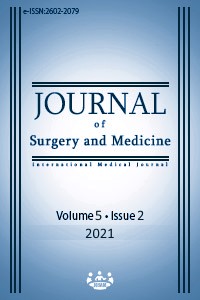Protective effect of resveratrol on the kidney in rats under immunosuppression with tacrolimus
Keywords:
Anti-inflammatory, antioxidant, immunosuppression, resveratrol, tacrolimusAbstract
Background/Aim: Tacrolimus is a commonly used agent for immunosuppression in organ transplantation with known nephrotoxic effects. We think that kidney-sparing therapy should be added to current treatment protocols. We aimed to observe the protective effect of resveratrol (RSV) against the adverse effects of tacrolimus (TAC) on rat kidneys. Methods: Twenty-four rats were randomly divided into the following three groups of eight rats each: Control, TAC, and RSV. The control group was not treated in any way. Tacrolimus was administered to the TAC group. In addition to tacrolimus use, resveratrol was administered to the RSV group. At the end of the experiment, one kidney was used for histopathological examination and the other, for biochemical examination. Results were analyzed statistically. Results: IL-1β, IL-6, TNF-Alpha levels in the control group were significantly lower than those in TAC and RSV groups (IL-1; P<0.001, P<0.001, IL-6; P<0.001 P=0.002, TNF-Alpha; P<0.001, P<0.001), and those in the RSV group were significantly lower than those in the TAC group (IL-1: P=0.032, IL-6: P=0.001 TNF-Alpha: P=0.026). TAS levels of the control group were significantly higher than those of the TAC group (P=0.030). TOS and OSI levels of the control group were significantly lower than those of the TAC and RSV groups (TOS: P=0.002, P=0.012, OSI: P=0.001, P=0.004). In histopathological evaluation, the TAC group showed the highest levels of fibrosis. The differences between the control and TAC groups and the TAC and RSV groups were statistically significant (P=0.003, P=0.003). Conclusion: Resveratrol has a protective effect against the adverse effects of tacrolimus on the kidney, which may be because of its anti-inflammatory and antioxidant properties.
Downloads
References
Daniel A, Rainer O, Uwe H, Ondrej V, Licia P, Christophe M, et al. Recent advances in kidney transplantation: a viewpoint from the Descartes advisory board. Nephrol Dial Transplant. 2018; Oct 1;33(10):1699-707. doi: 10.1093/ndt/gfx365.
Calvo-Turrubiartes M, Romano-Moreno S, García-Hernández M, Chevaile-Ramos JA, Layseca-Espinosa E, González-Amaro R, et al. Quantitative analysis of regulatory T cells in kidney graft recipients: a relationship with calcineurin inhibitor level. Transpl Immunol. 2009; May;21(1):43-9. doi: 10.1016/j.trim.2009.02.002.
Loong CC, Lin CY, Lui WY. Expression of interleukin-17 as a predictive parameter in acute renal allograft rejection. Transplant Proc. 2000; Nov;32(7):1773. doi: 10.1016/s0041-1345(00)01382-8.
David IP. Sourcing a chemical succession for cyclosporin from parasites and human pathogens. Drug Discov Today. 2005; May 15;10(10):688-91. doi: 10.1016/S1359-6446(05)03395-7.
Meng Y, Mouze L, Wei Z, Yingzi M. Pharmacokinetics, pharmacodynamics and pharmacogenetics of tacrolimus in kidney transplantation. Curr Drug Metab. 2018;19(6):513-522. doi: 10.2174/1389200219666180129151948.
Byung HC, Kyoung WK, Bo MK, Shang GP, Sun WL, Bum SC, et al. Dysregulation of Th17 cells during the early post-transplant period in patients under calcineurin inhibitor based immunosuppression. PLoS One. 2012;7(7):e42011. doi: 10.1371/journal.pone.0042011.
Anne LW, Joseph AB, Ole V. mTOR: more targets of resveratrol?. Expert Rev Mol Med. 2013; Sep 23;15:e10. doi: 10.1017/erm.2013.11.
Tomasz S, Katarzyna S. Resveratrol and diabetes: from animal to human studies. Biochim Biophys Acta. 2015; Jun;1852(6):1145-54. doi: 10.1016/j.bbadis.2014.10.013.
Lynn DC, R Neal S, Robert BC. Kidney transplantation: mechanisms of rejection and acceptance. Annu Rev Pathol. 2008;3:189-220. doi: 10.1146/annurev. pathmechdis.3.121806.151508.
Manuel RP, Marta GM, Douglas T, Brian RD, Emmanuel T, Kurinchi SG. Maintenance immunosuppression for adults undergoing liver transplantation: a network meta-analysis. Cochrane Database Syst Rev. 2017; Mar 31;3(3):CD011639. doi: 10.1002/14651858.CD011639.pub2.
Millis JM, Woodle ES, Piper JB, Bruce DS, Newell KA, Seaman DS, et al. Tacrolimus for primary treatment of steroid-resistant hepatic allograft rejection. Transplantation. 1996; May 15;61(9):1365-9. doi: 10.1097/00007890-199605150-00014.
Shang GP, Sun WL, Kyoung CD, Long J, Seong BH, Yu FZ. Combined treatment of tacrolimus and everolimus increases oxidative stress by pharmacological interactions. Transplantation. 2014; Jul 15;98(1):22-8. doi: 10.1097/TP.0000000000000146.
Akbulut S, Dogan Z, Baskiran A, Elbe H, Turkoz Y. Effect of a honey and arginine-glutamine-hydroxymethylbutyrate mixture on the healing of colon anastomosis in rats immunosuppressed with tacrolimus. Biotech Histochem. 2019; Oct;94(7):514-21. doi: 10.1080/10520295.2019.1601257
Belgaied J-E. Resveratrol content of Tunisian wines. Journal of Wine Research. 2001; 12:47-52
Savouret JF, Quesne M. Resveratrol and cancer: a review. Biomed Pharmacother. 2002; Mar;56(2):84-7. doi: 10.1016/s0753-3322(01)00158-5.
Amiot MJ, Riva C, Vinet A. Effects of dietary polyphenols on metabolic syndrome features in humans: a systematic review. Obes Rev. 2016; Jul;17(7):573-86. doi: 10.1111/obr.12409.
Rodica PB, Andrew Y. Resveratrol and malignancies. Curr Pharmacol Rep. 2015; Aug;1(4):266-71. doi: 10.1007/s40495-015-0030-1
Chibuike CU, Vanu RR, Rotimi EA, Peter JHJ. Potential of resveratrol in anticancer and anti-inflammatory therapy. Nutr Rev. 2008; Aug;66(8):445-54. doi: 10.1111/j.1753-4887.2008.00076.x.
Sara H, Karen LT, Steen BP, Hendrik V, Jacob G, Henning G. Effects of resveratrol in experimental and clinical non-alcoholic fatty liver disease. World J Hepatol. 2014; Apr 27;6(4):188-98. doi: 10.4254/wjh.v6.i4.188.
Alessandra F, Mariangela DG, Vincenzo Z. Antioxidant dietary approach in treatment of fatty liver: new insights and updates. World J Gastroenterol. 2017; Jun 21;23(23):4146-57. doi: 10.3748/wjg.v23.i23.4146.
Zakaria MMH, Hajipour B, Estakhri R, Saleh BM. Anti-oxidative effect of resveratrol on aluminum induced toxicity in rat cerebral tissue. Bratisl Lek Listy. 2017;118(5):269-72. doi: 10.4149/BLL_2017_053.
Eva D, Alena P, Jolana C, Alejandro C, Lucie H, Milos H, et al. Resveratrol modifies biliary secretion of cholephilic compounds in sham-operated and cholestatic rats. World J Gastroenterol. 2017; Nov 21;23(43):7678-92. doi: 10.3748/wjg.v23.i43.7678.
Downloads
- 748 925
Published
Issue
Section
How to Cite
License
Copyright (c) 2021 Hüseyin Özden, Muhammed Gömeç, Yaşar Şahin, Gökhan Karaca, Huri Bulut, Asuman Kilitci
This work is licensed under a Creative Commons Attribution-NonCommercial-NoDerivatives 4.0 International License.
















